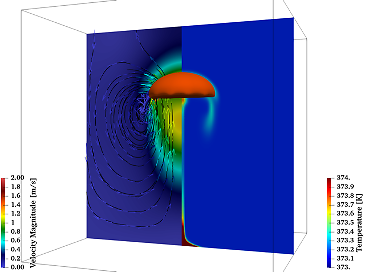[Seminar] Diffuse-interface framework for boiling flows with contact-line model

Date
Location
Description
Speaker
Prof. Luca Brandt
Flow, Department of Engineering Mechanics, KTH, SE-10044, Stockholm, Sweden
Department of Energy and Process Engineering, Norwegian University of Science and Technology (NTNU), Trondheim, Norway
Luca Brandt is professor in Fluid Mechanics at the Royal Institute of Technology (KTH), Stockholm, Sweden since 2012 and at the Department of Energy and Process Engineering, NTNU, Trondheim, Norway since 2021. He received a Masters in Mechanical Engineering from University of Rome, La Sapienza in 1997, and PhD in Fluid Mechanics at KTH in 2003. Before joining KTH as assistant professor he spent several months at Ecole Polytechnique, Palaiseau, France and at the University of Bologna, Italy. Luca’s research interests are in the general area of multiphase turbulence, particle laden flows, heat and mass transfer, low-Reynolds-number flows and complex fluids, hydrodynamic instabilities and flow control, with focus on the development of theoretical models and high-fidelity numerical simulations. He has more than 180 peer-reviewed journal papers including 1 Annual Review Fluid Mechanics in 2022. He was the recipient of an ERC consolidator grant to study particle suspensions in 2013 and of the "outstanding young researcher" award from the Swedish Research Council in 2014. He had been awarded the G. Gustafsson prize in 2005 and the position as outstanding researcher in Mechanics by the Swedish Research Council in 2008. Luca has served the community organizing several workshops and summer schools and is associated editor of the European Journal of Mechanics/B and of MECCANICA.
Title
Diffuse-interface framework for boiling flows with contact-line model
Abstract
We present a diffuse-interface numerical approach for compressible two-phase flows with phase change, including the ability to model wetting. The algorithm employs a four-equation diffuse-interface formulation, which assumes instantaneous kinetic, mechanical, and thermal equilibrium, while allowing for chemical disequilibrium between the two phases, hence phase change. In order to target boiling flows at low speeds, we resort to a pressure-based method previously proposed, which allows us to treat acoustic effects implicitly and still account for compressibility and complex thermodynamics. Here, we demonstrate the need to introduce an augmented four-equation formulation to ensure discrete mass conservation in the absence of phase change and of interface regularization to improve the accuracy of the topological description and also derive a mass-conserving contact-angle boundary condition. Finally, results on a vapor bubble detaching from a heated wall are presented for different surface properties.
Subscribe to the OIST Calendar: Right-click to download, then open in your calendar application.



